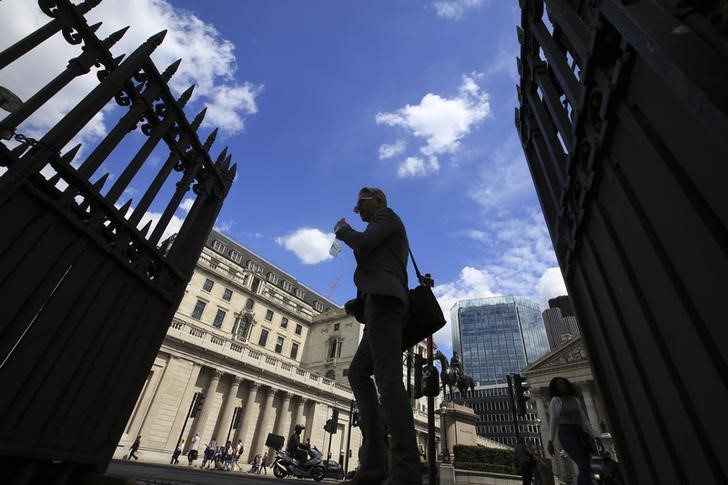By Jonathan Cable
LONDON (Reuters) - Britain's vote to leave the European Union means the Bank of England will take borrowing costs to a new low this week as it makes a pre-emptive strike to try to ward off a recession and to reassure markets, a Reuters poll found.
Only last week, the median in a Reuters poll predicted the Monetary Policy Committee would hold Bank Rate at 0.5 percent on Thursday but the latest survey taken on Wednesday points to a 25 basis point cut.
On Tuesday, Bank Governor Mark Carney gave another hint more stimulus was on the way, saying a hit to Britain's economy from last month's referendum could prompt the Bank to act.
"Carney once again signalled that the Bank has the tools to respond to economic developments," said James Knightley at ING.
"That tool box looks set to be re-opened tomorrow; we think the BoE will react to downside economic risks generated by Brexit uncertainty."
Thirty-nine of the 60 economists polled by Reuters on Wednesday said the Bank would chop at least 25 basis points from the 0.5 percent Bank Rate has sat at since early 2009 on Thursday.
The median forecast was for a cut to 0.25 percent, with 35 of 60 saying so; two forecast a 50 basis point cut to zero and another two said 40 basis points to 0.10 percent.
Financial markets have almost completely priced in a cut on Thursday.
A July 5 Reuters poll found just 19 of 52 economists predicting any change this week, with the consensus for more easing to come later in the year, yet so much has changed in a very short period of time.
Since the referendum, sterling has sunk 12 percent to a 31-year low against the dollar, and will probably fall another 3 percent according to that July 5 poll.
The Bank will re-start its asset purchases later this year - probably in August - topping up the 375 billion pound programme it wound up in 2012 with another 50 billion pounds, the poll found. Only seven expected an increase this week.
"In addition to a rate cut in either July or August, we look for the BoE to restart its asset purchase programme in August," said Kallum Pickering at Berenberg.
"With appropriate monetary policy support, the economy could scrape through with only a big dent to growth over the next year or two, rather than a big recession."

There was a 53 percent chance of a British recession in the coming year, a Reuters poll taken the day after the June 23 referendum found.
(Polling by Reuters Polls Bengaluru Editing by Jeremy Gaunt.)